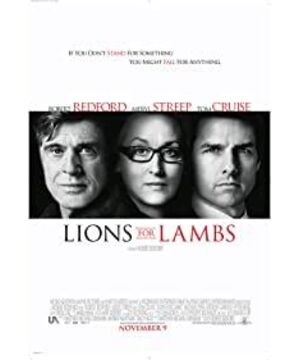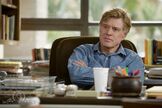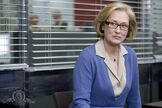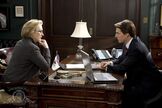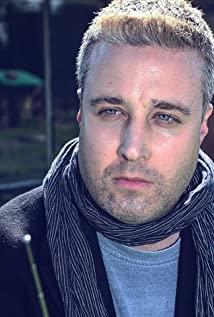: Dr. Malley (Robert Redford) and students Todd, Senator Ivring (Tom Cruise) and Reporter Janine (Meryl Streep), and Arian and Ernest, classmates and comrades on the battlefield . These three clues constitute three fields, the two within each field resist each other, and the three fields resist each other. The director's intention is to criticize the series of wars the United States has waged in the Middle East based on false premise, which triggers a reflection on the so-called democratic mechanism.
Dr. Malley was in a rather awkward position. Despite the trauma of the Vietnam War, he still did not lose confidence in this country. He displayed his ambition by teaching students. This ambition is to hope that students can care about politics. In his opinion, the more people are concerned about politics and the country The more you care about the future, the more likely you will get a more positive force than war to push the country to a bright future. However, to his surprise, his students Arian and Ernest both took joining the army to join the war in Afghanistan as the most effective way to serve the country, while the other extreme is that the student Todd was completely political after seeing through political tricks and power contests. Give up confidence. And Dr. Malley doesn't want his students to get involved in the war and become the victims of this wrong political decision, and he also doesn't want young people to be indifferent to politics, which undoubtedly makes the country slip more down the wrong road. Yuan has lost hope of redemption.
The film, in particular, was criticized by critics for being too much dialogue. A review on The Boston Globe called it "political drama feels more like a lecture." The whole film is not so much a film as a series of speeches and admonitions: the congressman reprimanded the reporter, the professor reprimanded the students, the two students who gave the professor hope admonished their classmates, and the lieutenant colonel admonished the army.
Indeed, the film has a lot of dialogue. Fortunately, these conversations are still brilliant, fast and powerful, and thought provoking. Maybe in terms of the tectonic elements of film art, this is a flaw, but some audience members like me who don't need to be an Oscar judge but are attracted by the dialogue will not mind this problem. Although the film was bombarded by film critics after it was released in the United States, Europe and other places, it still has its merits. At least for a person living in a country that generally lacks democracy, even if the film disintegrates the mythical meaning of democracy, the process of disintegration may have another meaning for a group of people who watched from a distance and did not gain it. Refactor. This may be more indicative of what is falsifiable less deceptive.
The Hollywood Reporter believes that the director and screenwriter presented the audience with views for and against the US invasion of Iraq and Afghanistan in a calm and non-emotional way, which triggered the audience to think deeply. Redford's film appeals to those who think the U.S. military is wrong to wage war, but his responsible tone will appeal to a wider audience. This is a rare affirmation in many comments. Of course, this may have something to do with the film being made in Hollywood.
Whether the disoriented medias
are independent or not, whether this question should be or is inevitability, there is still no conclusion. However, in this film, it is clearly seen that under the most transparent democratic mechanism, the media, as the fourth power, still cannot maintain its independence. As Tom Tom's senator in the film said, the media is like smoke, where the wind runs.
The mistakes of this war, which was longer than World War I, manifested in time, just as water gradually evaporates in the sun before slowly revealing the grains of salt. The government is the culprit responsible for this crime, but the media are also accomplices, and the public cannot escape their involvement. In order not to challenge the nervousness after the 9/11 terrorist attack, and not to go against the rising public opinion when the United States launched the war, the media uniformly maintained selective speeches, and published those very patriotic supporting speeches "in accordance with public opinion".
However, when the grains of salt were exposed, the media and the public realized their mistakes and fled their original position in a hurry, trying to pull back the ship that was sailing in the wrong direction. However, the government was caught in the quagmire of war and could not control itself. What is the media like at this time? Desperately expose the government's main war policy, or follow the existing path and help it in order to win the war through high popular support? Who can prove that exposing can recover mistakes and losses, or not lose more? How can you prove that if you continue to follow the same path, you will be successful?
At this moment, simply saying that the media's responsibility is to reveal the truth and seek justice is a bit naive and almost stupid. When it comes to national interests, individual liberties, and the way out for democracy, any decision can lead to failure. And a rule of the world is that failure is wrong, and success is eventually recognized.
What is Janine's final choice: to follow the boss's request and write a "propaganda rhetoric" that only listens to the government's words and cannot be verified, or stick to the conscience and professional ethics of an experienced journalist who has been in the industry for 40 years. give up?
Politicians, media, educators, military chiefs, and a submissive public are brought together, and the film presents a field of thought that has no answers but many important questions.
I had to think, what did democracy bring? No one says that democracy will definitely bring a bright and correct future, it just provides a possibility that the whole public can choose their own destiny, it guarantees the process and procedure but not the result. Although the worst it could be to lead the whole to the grave, I still think it's great. For a nation or country that has suffered from the beautiful lies of tyranny and totalitarianism, and the loss of individual rights and will for a long time, it is more appropriate to walk into the grave in this way than to be pushed into the grave by others.
View more about Lions for Lambs reviews


